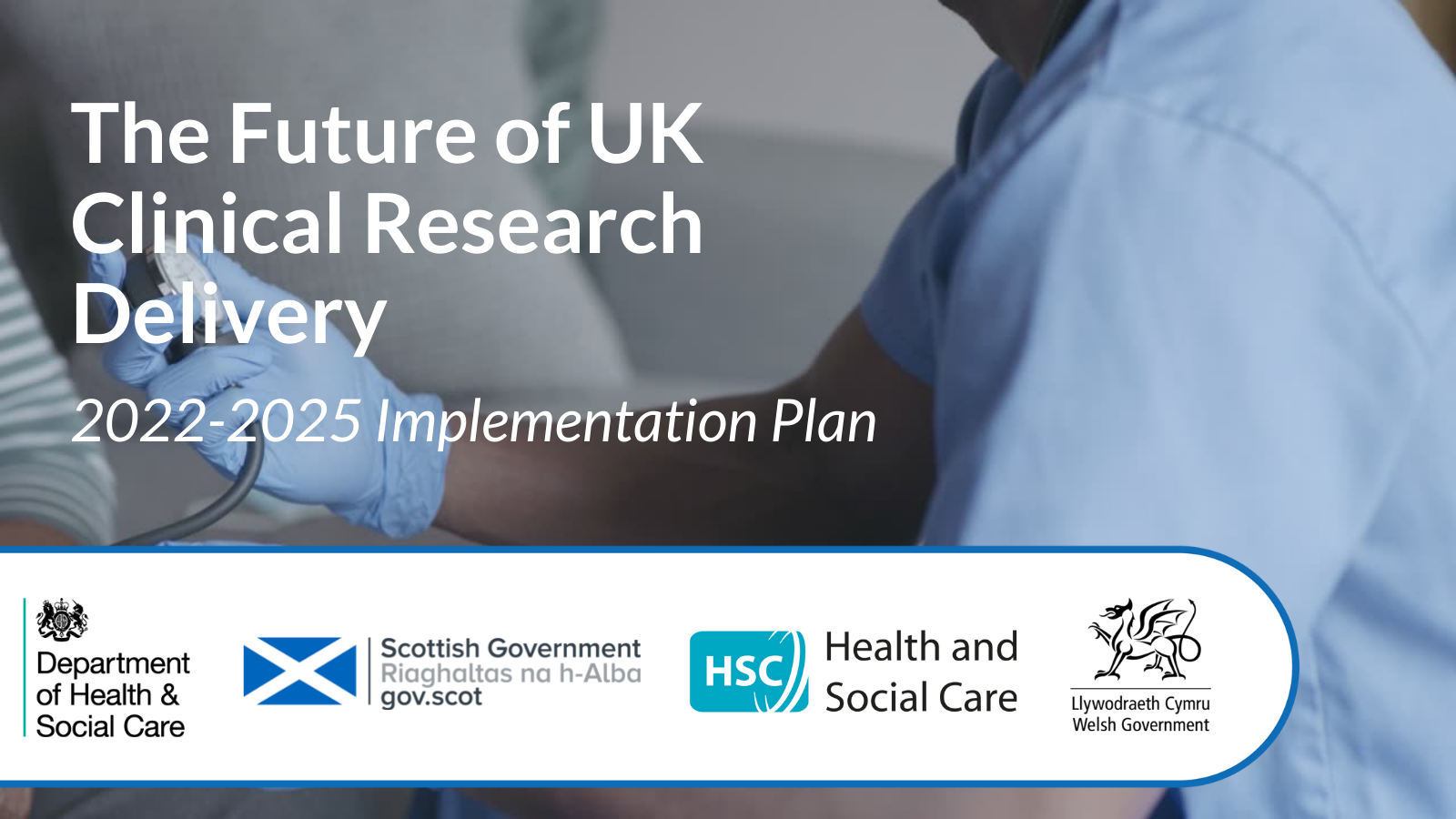
Published: 30 June 2022
The UK-wide plan setting out the second phase of work to transform clinical research delivery across the country has been published today.
The three year plan, which drives towards achieving the vision for the Future of UK Clinical Research Delivery, has been developed by the NIHR working with partners across the UK research system as part of the UK Recovery, Resilience and Growth (RRG) programme.
The plan aligns with funding confirmed through the Government spending review for April 2022 to March 2025 and includes up to £150 million of additional funding from the NIHR and £25 million additional funding from RRG partners across the UK. This complements up to £200 million in England for the data for research and development programme, announced in March 2022.
The plan focuses on 5 themes shaped around the UK Government’s bold vision for a more patient-centred, pro-innovation and digitally-enabled clinical research environment, which builds on the successes and the lessons learnt in response to COVID-19 and includes specific actions to:
- Recover the UK’s capacity to deliver research following the pandemic, building back a more responsive and resilient research system.
- Continue to support the UK’s expert research workforce, and develop workforce plans in order to enable strategic investment in capacity development.
- Broaden responsibility and accountability for research across the NHS, and improve the visibility and recognition of those delivering clinical research studies, ensuring that research is a normal part of high quality care.
- Revolutionise how research is designed and delivered in the UK so that it is inclusive, accessible, involves those with greatest need and addresses the challenges facing the NHS.
- Streamline and strengthen the regulatory environment to ensure faster approval, set-up and delivery of studies and use the unique opportunity outside the EU to create a more flexible and improved regulatory model for clinical research.
- Ensure the whole of the UK population can benefit from taking part in research by investing in the infrastructure and tools needed to implement people centred, innovative, data and digitally-enable trials.
- Make the UK’s clinical research offer clear and accessible and improve our attractiveness as a leading destination for cutting edge and global multi-centre clinical studies.
Professor Lucy Chappell, Chief Executive of the NIHR, said:
“Over the past year, the NIHR has been at the forefront of the UK’s vision to transform the future of research delivery. Together with our partners we have made great progress against our commitments, delivering real change for patients and researchers, and maximising every opportunity to build a better and more resilient clinical research system.
"These plans mark our shared commitment to strengthen our efforts and to remain focused on our drive for efficient, innovative and patient-centred research that meets the health and care challenges of the future.”
The work strives to create a clinical research delivery ecosystem which will shape the future of health and care, tackling health inequalities, and improve people’s lives for years to come. Key achievements include:
- Enhancing the Be Part of Research Website to enable the patients and public to more easily conduct online searches and find research more relevant to their needs and location right across the UK.
- Leading a decentralised trial design and delivery model to reduce the need for patients to travel to a specific location to participate in a study, enabling patients to take part in clinical research who might otherwise struggle to participate.
- Demonstrating the UK’s growing ability to harness technology and conduct studies virtually and in the community, such as the PANORAMIC trial of antiviral treatments for COVID-19 and the RELIEVE IBS-D virtual trial.
- Publication of Race Equality Framework - a self-assessment tool to help organisations improve racial equality in public involvement in health and care research.
- Launching a new UK-wide professional accreditation scheme for Clinical Research Practitioners (CRP) as part of efforts to double the number of this important workforce over the next few years.
- Launching the NIHR Associate Principal Investigator Scheme to make research a routine part of clinical training, to develop health and care professionals to be the PIs of the future and to recognise and promote health professionals’ engagement in NIHR portfolio research in a consistent manner.
Jeremy Taylor, NIHR Director for Public Voice, said:
“We are committed to working in partnership with patients and the public to ensure they are integral to our vision for clinical research. Across the UK we are working for more inclusive and accessible research, which is embedded in health and care services and which meets the needs of communities.
"We thank our public partners for their support and contribution over the last year and look forward to collaborating further.”
Find out more about the UK Clinical Research Recovery, Resilience and Growth Programme and the work that has already been undertaken in the 2021-2022 Implementation plan on the dedicated RRG microsite.
Background information
The vision for the future of UK clinical research delivery has been developed by the UK Recovery, Resilience and Growth programme in consultation with NHS, academia, regulators, life sciences industry, medical research charities, patient participants and the public.
This 4-nation cross-sector group is made up of the key organisations involved in the delivery of clinical research in the UK, including:
- Association of the British Pharmaceutical Industry (ABPI)
- Association of Medical Research Charities (AMRC)
- Chief Scientist Office, Scotland (CSO)
- Department of Health and Social Care (DHSC)
- Health and Care Research Wales (HCRW)
- Health Research Authority (HRA)
- Health and Social Care, Northern Ireland (HSCNI)
- Medicines and Healthcare Products Regulatory Agency (MHRA)
- MedTech industry representation
- NHS England
- NHS Digital
- National Institute for Health and Care Research (NIHR)
- Office for Life Sciences (OLS)
The 5 key themes underpinning the vision are:
- clinical research embedded in the NHS
- patient-centred research
- streamlined, efficient and innovative research
- research enabled by data and digital tools
- a sustainable and supported research workforce

